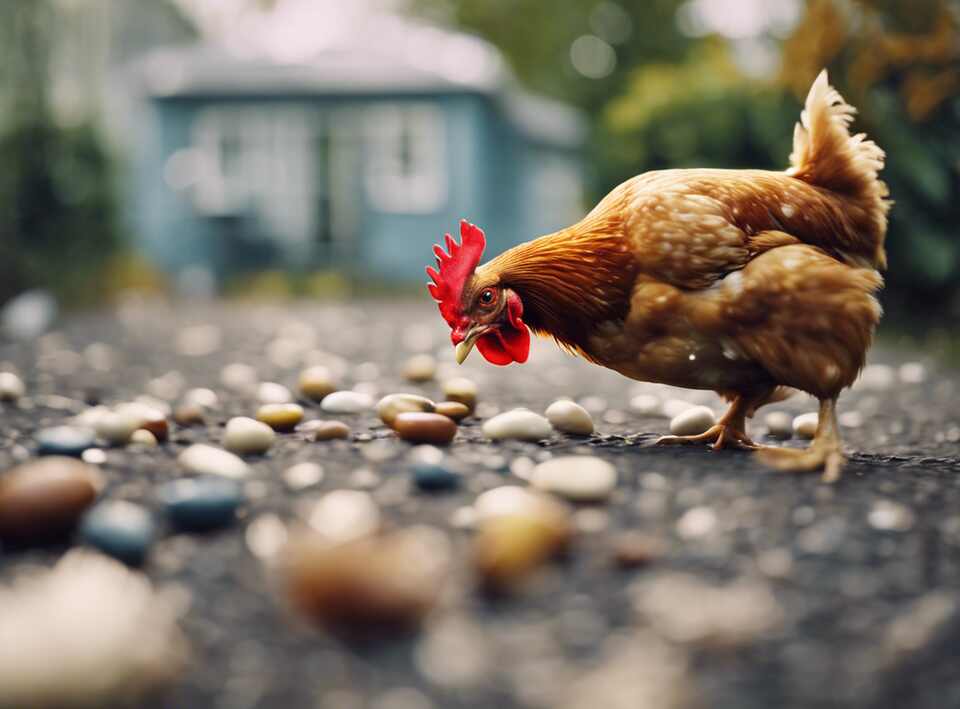Bird behavior can often seem mysterious to us humans, especially when it involves seemingly unusual activities like eating stones. Yet, there’s a fascinating reason behind this behavior. In this exploration, we delve into the intriguing phenomenon of why birds eat stones and uncover the surprising insights behind this seemingly peculiar habit.
Table of Contents
Why Do Birds Eat Stones?
The Surprising Benefits of Stones in a Bird’s Diet
Birds are fascinating creatures, and their dietary habits are often quite remarkable. One curious aspect of their feeding behavior is the tendency of some species to consume stones. While it may seem unusual, there are several compelling reasons why birds eat stones, and the practice offers a number of benefits to these winged creatures.
Aiding Digestion
One of the primary reasons birds eat stones is to facilitate the digestive process. Many birds, particularly those that feed on seeds, grains, and other hard-to-digest foods, rely on stones to help grind and break down their meals. These stones, often referred to as “grit,” are swallowed and stored in the bird’s gizzard, a specialized muscular organ that acts as a natural “food processor.”
As the gizzard contracts, the stones rub against the food, effectively grinding it into smaller pieces. This process helps the bird’s digestive system better absorb the nutrients from their food, ensuring they get the most out of every meal. Without the aid of these stones, some birds would struggle to properly digest their food, which could lead to malnutrition or other health issues.
Providing Micronutrients
In addition to aiding digestion, the stones that birds consume can also serve as a valuable source of micronutrients. Certain types of stones, such as those rich in calcium or grit, can provide birds with essential minerals that they may not be able to obtain in sufficient quantities from their regular diet.
Regulating Gut Health
Another intriguing reason why birds eat stones is to help regulate their gut health. The presence of stones in a bird’s digestive system can create a favorable environment for the growth of beneficial bacteria, which are essential for maintaining a healthy gut microbiome.
These beneficial bacteria play a crucial role in breaking down and processing the food that birds consume, as well as supporting their immune system and overall well-being. By consuming stones, birds can help create the ideal conditions for these helpful microorganisms to flourish, promoting better digestion and improved overall health.
Reducing Toxin Levels
In certain environments, birds may encounter toxic substances or heavy metals in their food sources. Consuming stones can help these feathered creatures mitigate the harmful effects of these toxins by binding to them and facilitating their removal from the body.
The stones act as a natural detoxification agent, trapping the harmful substances and allowing the bird to excrete them safely. This can be especially beneficial for birds that live in urban areas or near industrial sites, where environmental pollution may pose a threat to their health.
Satisfying Behavioral Needs
The act of eating stones may also serve a behavioral purpose for some bird species. Certain birds, such as parrots and cockatoos, have a natural inclination to explore their environment and manipulate objects with their beaks. Consuming stones can provide these birds with a satisfying and enriching activity, helping to fulfill their innate behavioral needs and contributing to their overall well-being.
The practice of birds eating stones is a fascinating and multifaceted aspect of their feeding behavior. From aiding digestion and providing essential micronutrients to regulating gut health and reducing toxin levels, the consumption of stones offers a wide range of benefits for these winged creatures. By understanding the reasons behind this behavior, we can gain a deeper appreciation for the complex and adaptive nature of birds and their remarkable adaptations to the natural world.
Common Birds That Eat Stones
| Common Birds That Eat Stones | Why They Do It |
|---|---|
| Chickens | Aid in the breakdown of food in their gizzards. |
| Turkeys | Assist in grinding hard-to-digest items like seeds and nuts. |
| Pigeons | Help with the mechanical digestion process. |
| Doves | Facilitate the breakdown of food in their digestive systems. |
| Grouse | Aid in the grinding of seeds and grains. |
| Partridges | Support the digestive process, especially for grains. |
| Quails | Assist in breaking down hard food items. |
| Ducks | Help grind and break down food in their gizzards. |
| Geese | Facilitate the digestion of tough plant materials. |
| Swans | Aid in the mechanical breakdown of food items. |
The Nutritional Benefits of Stone Consumption for Birds
The Hidden Benefits of Stone Consumption for Birds
Birds are fascinating creatures, and their dietary habits have long been a topic of fascination for both bird enthusiasts and scientists alike. One aspect of bird nutrition that often goes unnoticed is the role of stone consumption, which can provide a range of surprising benefits for our feathered friends.
The Digestive Importance of Stones for Birds
For many bird species, the consumption of small stones, also known as grit, plays a crucial role in their digestive process. These stones serve as a natural way for birds to aid in the breakdown and digestion of their food. As birds lack teeth, they rely on the grinding action of stones in their gizzard to grind up seeds, nuts, and other hard-to-digest items they consume.
The gizzard, a muscular organ found in the digestive tract of birds, acts as a natural “mill,” using the stones to break down and grind the food into smaller pieces. This process not only helps the birds extract more nutrients from their food but also ensures that they can effectively pass the indigestible materials through their system.
Mineral Supplementation and Bone Health
In addition to their digestive benefits, the stones that birds consume can also serve as a valuable source of essential minerals. Many types of stones, such as grit or gravel, contain trace minerals like calcium, phosphorus, and others that are crucial for the overall health and development of birds.
These minerals play a vital role in supporting strong bones, eggshell formation, and various other physiological processes. By consuming stones, birds can supplement their diet with these essential nutrients, helping to ensure their skeletal system remains robust and their overall health is maintained.
Parasite Prevention and Immune Support
Interestingly, the consumption of stones may also have a protective effect against parasites and other pathogens. Some studies have suggested that the abrasive nature of the stones in a bird’s gizzard can help to physically remove or dislodge internal parasites, reducing the risk of infestations.
Moreover, the minerals present in the stones may also have antimicrobial properties, potentially helping to boost the bird’s immune system and defend against harmful bacteria or viruses. By incorporating stone consumption into their routine, birds can enhance their natural defenses and maintain a healthier overall condition.
Diverse Stone Selection for Optimal Benefits
Not all stones are created equal when it comes to the nutritional needs of birds. Different bird species may have preferences for specific types of stones, and the availability of these stones in their natural habitats can vary. For example, some birds may favor small, smooth pebbles, while others may prefer angular or rougher stones.
To ensure that birds receive the full range of benefits from stone consumption, it is important for bird owners or those who live in close proximity to bird habitats to provide a diverse selection of stone types. This diversity allows birds to choose the stones that best suit their individual needs and preferences, optimizing the nutritional and digestive advantages they can obtain.
The role of stone consumption in the lives of birds is a fascinating and often overlooked aspect of their biology. From aiding in digestion to supporting bone health and immune function, these small, unassuming stones play a vital part in the overall well-being of our feathered friends. By understanding and appreciating the hidden benefits of stone consumption, we can gain a deeper appreciation for the complex and intricate requirements of bird nutrition and health.
Conclusion
Birds’ stone-eating behavior has intrigued naturalists and birdwatchers for centuries. While it may seem like an odd practice, the reasons behind it are quite fascinating and serve an important biological purpose.
The primary reason birds eat stones is to aid in their digestion. Birds lack teeth, so they rely on a gizzard, a specialized muscular organ, to grind and break down their food. The stones, or grit, they consume act as a natural “grinding mill” within the gizzard, helping to crush and grind seeds, grains, and other hard-to-digest materials. This allows the birds to extract maximum nutrition from their food, ensuring they get the energy and nutrients they need to survive and thrive.
In addition to the digestive benefits, stone consumption also provides birds with essential minerals that they may not be able to obtain from their regular diet. Many bird species, especially those that primarily eat seeds and grains, can be deficient in certain minerals like calcium, iron, and grit. By intentionally seeking out and consuming stones, they are able to supplement their diet and ensure they get the full spectrum of nutrients required for healthy bone development, egg production, and overall wellbeing.
For birds that live in environments where natural grit and stones may be scarce, such as those residing in heavily forested areas or urban settings, the need to seek out and consume stones becomes even more critical. They may travel great distances to find suitable grit sources, demonstrating the importance of this behavior to their survival.
Interestingly, different bird species seem to have preferences for the type and size of stones they consume. Some prefer smooth, rounded pebbles, while others may gravitate towards angular or sharp-edged stones. The size of the stones is also carefully selected, with birds choosing pieces that are appropriately sized for their gizzard and feeding habits.
Researchers have also discovered that the composition of the stones can vary depending on the bird’s specific nutritional needs. For example, birds that require higher calcium levels may seek out limestone or other calcium-rich stones, while those in need of iron may consume stones with higher iron content.
The act of stone consumption is not limited to just a few bird species; it is a widespread behavior observed across a vast array of avian families, from songbirds and waterfowl to raptors and game birds. This universal practice highlights the evolutionary significance and importance of this behavior for the overall health and well-being of birds.
As we continue to study and observe the stone-eating habits of birds, we gain valuable insights into their complex biology, nutritional requirements, and adaptations to their environments. By understanding the reasons behind this seemingly unusual behavior, we can better appreciate the intricate web of life that sustains the avian world and the remarkable ways in which these feathered creatures have evolved to thrive in their diverse habitats.
The practice of stone consumption by birds is a fascinating and essential aspect of their biology. From aiding in digestion to providing vital minerals, the stones birds ingest play a crucial role in their overall health and survival. As we continue to unravel the mysteries of this behavior, we gain a deeper appreciation for the remarkable adaptations and strategies that birds employ to meet their nutritional needs and thrive in the natural world.




